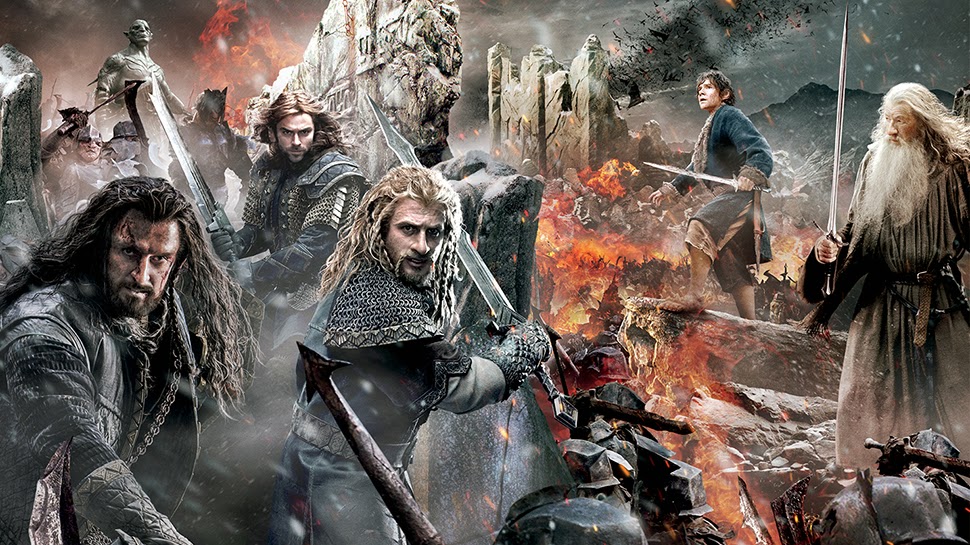 |
| Just a sample of the non-stop, overlapping action that is most of Battle of the Five Armies. |
Peter Jackson is much like a big kid with a huge Middle-Earth action play set. having dispensed for the most part with the events of the original novel in the first two movies, he gets to stretch out on the final battle scenes with greatly extended action sequences. His sense of cinematic place and direction is a good as ever, though, and the thousands of little CG soldiers on the screen never lose a sense of coherent action. And the ending is quite satisfying and presented without having to resort to the 6 endings of the last Lord of the Rings movie-- just one tidy ending, thank you.
Then again, the action on-screen versus the content of the original novel created a strange narrative situation where Bilbo Baggins (Martin Freeman) the titular hero of the film, disappears from the narrative for long stretches of time. I'm reminded of the third Matrix movie, where Neo disappears for most of a movie in which he is the putative savior.
Point-to-point:
• I only counted four armies. My issue probably lies with Tolkien, not Jackson.
 |
| Tauriel, cute as an elf. |
We also get something sorely needed in big action franchises like this: a love story. Sure, Tauriel the silvan elf may have been invented to prevent it from being the sausage fest of the original book, but it's welcome. She falls for Kili the dwarf, fully two heads shorter than her, but their love-at-first-sight relationship carries resonance-- and this is a welcome break from the general tones of madness, hate and manly stoicism embodied by everybody else in the film.
A lot of this has to do with Evangeline Lily. She was the best thing about "Lost:" a soulful, loving yet complex and hermetic character in a cast of caricatures and cyphers. Lilly is a remarkably expressive actor and the only shame is she hasn't been in more movies. Tauriel gets to show love and loss and longing in a keener and more immediate way than anyone else in the entire trilogy. It's either a complement to Peter Jackson's skills as storyteller-- or an anodyne, in that he cannot conceive of anyone capable of having softer emotional connections than a-- shudder-- female character.
• You can tell the various races of creatures in this film-- in all the Rings and Hobbit films-- by how they appear after a little wear and tear. Hobbits (Bilbo at least) and Wizards get completely filthy: in fact, the wizard Radegast the Brown has shown up in all three Hobbit movies with a wad of dried bird shit stuck to his head. Humans and Dwarves are sort of grungy all the time, never too clean or too dirty. Elves-- the overachievers of Middle Earth-- never have a hair out of place or a smudge on their clothes. Orcs are similarly neat, all things considered: the lead Orcs wear little bits of armor and show a lot of skin, and would not look out of place in a Pride parade.
• The HFR process: Much improved of the first Hobbit movie. It might be the outdoorsy settings overall, but the scenes seem brighter and more colorful than the dark, washed-out first installment. The 3D was remarkably restrained and natural-looking: There were only a few gimmicky shots of falling stones and billowing flame and whatnot. Whatever Peter Jackson's tech folks needed to do to get the look of 48-frame-per-second to not look like video gloss, they did it.
Peter Jackson, Tolkien: It's been a hell of a ride. The first film series raised the bar for fantasy films forever. The last three, while somewhat under-stuffed and not quite as novel as the first three, are still deserving of all the success they have reaped. If this is Jackson's victory round, he can and should be allowed to freestyle a bit.



